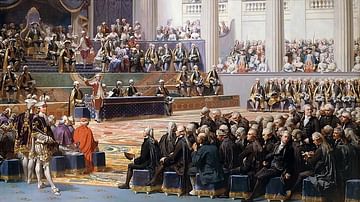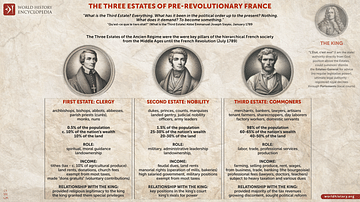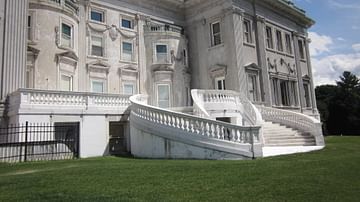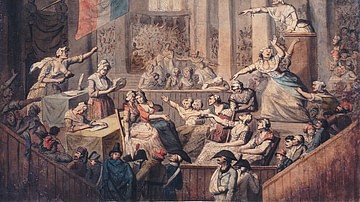What is the Third Estate? was a pamphlet published by Abbè Emmanuel-Joseph Sieyès (1748-1836) in January 1789, months before the start of the French Revolution (1789-1799). The pamphlet concerns the place of the Third Estate (commoners) within the French nation, as well as what it should hope to gain from the Estates-General of 1789.
In the tumultuous months preceding the Estates-General, Sieyès’ pamphlet was widely read, and became influential in the policy of the Third Estate during that assembly, of which Sieyès himself played a major role. The basic summary of the pamphlet is that the Third Estate alone constitutes the whole of the nation, while the upper, privileged estates (nobility and clergy) were nothing more than dead weight. Sieyès argues that the Third Estate should use the Estates-General to restore its liberties, and impose its will on the nation.
The Text
The below passages are taken from the translation available on the website of the University of Oregon.
The plan of this book is fairly simple. We must ask ourselves three questions:
- What is the Third Estate? Everything.
- What has it been until now within the political order? Nothing.
- What does it want to be? Something.
We are going to see whether the answers are correct…We shall next examine the measures that have been tried and those that must still be taken for the Third Estate to really become something. Thus, we shall state:
- What the Ministers have attempted and what even the privileged orders propose to do for it.
- What ought to have been done.
- Finally, what remains to be done in order that the Third Estate should take its rightful place.
Chapter I: The Third Estate is a Complete Nation
What does a nation require to survive and prosper? It needs private activities and public services. These private activities can all be comprised within four classes of persons:
- Since land and water provide the basic materials for human needs, the first class, in logical order, includes all the families connected with work on the land. ...
- Between the initial sale of goods and the moment when they reach the consumer or user, goods acquire an increased value ... through the incorporation of varying amounts of labors. In this way human industry manages to improve the gifts of nature and the value of the raw material may be multiplied twice, or ten-fold, or a hundred-fold. Such are the activities of the second class of persons
- Between production and consumption, as also between the various stages of production, a variety of intermediary agents intervene, to help producers as well as consumers; these are the dealers and the merchants. .... Such is the function of the third class of persons.
- Besides these three classes of useful and industrious citizens ... society also requires a vast number of special activities and of services directly useful or pleasant to the person. This fourth class embraces all sorts of occupations, from the most distinguished liberal and scientific professions to the lowest of menial tasks.
Such are the activities which support society. But who performs them? The Third Estate.
Public services can also, at present, be divided into four known categories, the army, the law, the Church and the bureaucracy. It needs no detailed analysis to show that the Third Estate everywhere constitutes nineteen twentieths of them, except that it is loaded with all the really arduous work, all the tasks which the privileged order refuses to perform. Only the well paid and honorific posts are filled by members of the privileged order. Are we to give them credit for this? We could do so only if the Third Estate was unable or unwilling to fill these posts. We know the answer. Nevertheless, the privileged have dared to preclude the Third Estate. "No matter how useful you are," they said, "no matter how able you are, you can go so far and no further. Honors are not for the like if you."
... It suffices to have made the point that the so-called usefulness of a privileged order to the public service is a fallacy; that, without help from this order, all the arduous tasks in the service are performed by the Third Estate; that without this order the higher posts could be infinitely better filled; that they ought to be the natural prize and reward of recognized ability and service; and that if the privileged have succeeded in usurping all well-paid and honorific posts, this is both a hateful iniquity towards the generality of citizens and an act of treason to the commonwealth.
Who is bold enough to maintain that the Third Estate does not contain within itself everything needful to constitute a complete nation? It is like a strong and robust man with one arm still in chains. If the privileged order were removed, the nation would not be something less but something more. What then is the Third Estate? All; but an "all" that is fettered and oppressed. What would it be without the privileged order? It would be all; but free and flourishing. Nothing will go well without the Third Estate; everything would go considerably better without the two others.
…The Third Estate then contains everything that pertains to the nation while nobody outside the Third Estate can be considered as part of the nation. What is the Third Estate? Everything.
Chapter II: What has the Third Estate Been Until Now?
... the nation as a whole cannot be free, nor can any of its separate orders, unless the Third Estate is free. Freedom does not derive from privileges. It derives from the rights of citizens-and these rights belong to all.
If the aristocrats try to repress the People at the expense of that very freedom of which they prove themselves unworthy, the Third Estate will dare challenge their right. ... By Third Estate is meant all the citizens who belong to the common order. Anybody who holds a legal privilege of any kind deserts the common order, stands as an exception to the common laws and, consequently, does not belong to the Third Estate.
... It is indisputably only too true that in France a man who is protected only by the common laws is a nobody; whoever is totally unprivileged must submit to every form of contempt, insult and humiliation. To avoid being completely crushed, what must the unlucky nonprivileged person do? He has to attach himself by all kinds of contemptible actions to some magnate; he prostitutes his principles and human dignity for the possibility of claiming, in his need, the protection of a somebody
But we are less concerned in this book with the civil rights of the Third Estate than with its relationship to the constitution. Let us see what part it plays in the States-General.
Who have been its so-called “Representatives”? Men who have been raised to the nobility or have received temporary privileges. These bogus deputies have not even been always freely elected by the People. In the States-General sometimes, and in the Provincial Estates almost always, the representation of the People is considered as inherent in the holder of certain offices.
The old aristocracy detests new nobles; it allows nobles to sit as such only when they can prove, as the phrase goes, "four generations and a hundred years." Thus it relegates the other nobles to the order of the Third Estate to which, obviously, they no longer belong ... nobles always prefer each other to the rest of the nation. The usurpation is total; in every sense of the word, they reign.
If you consult history to verify whether the facts agree ... with my description, you will discover, as I did, that it is a great mistake to believe that France is a monarchy.With the exception of a few years under Louis XI and under Richelieu and a few moments under Louis XIV when it was plain despotism, you will believe you are reading the history of a Palace aristocracy. It is not the King who reigns; it is the Court. The Court has made and the Court has unmade; the Court has appointed ministers and the Court has dismissed them; ...
And what is the Court but the head of this vast aristocracy which overruns every part of France, which seizes on everything through its members ...
Finally, is it not enough simply to open our eyes to what is occurring around us at this very moment? What do we see? The aristocracy on its own, fighting simultaneously against reason, justice, the People, the minister and the King. The end of this terrible battle is still undecided. Can it still be said that the aristocracy is only a chimera!
Let us sum up: to this very day, the Third Estate has never had genuine representatives in the States-General. Thus its political rights are null.
Chapter III: What Does the Third Estate Want to Be?
... The authentic requests of the Third Estate can only be adjudged through the formal demands which the great municipalities of the kingdom have addressed to the government. What do we see therein? That the People want to become something, and in fact, the least thing possible. It wants to have (1) genuine representatives in the States-General, i.e. deputies drawn from its own ranks and competent to interpret its wishes and defend its interests. But what good would it do the Third Estate to participate in the States-General if the interest opposed to its own were to preponderate there? It would simply sanction by its presence the oppression of which it would be the everlasting victim. Therefore, it most certainly cannot come and vote in the States-General unless its influence there is at least equal to that of the privileged orders. So it asks for (2) a number of representatives equal to that of the other two orders taken together. However, this equality of representation would become entirely illusory if each chamber voted separately. The Third Estate, therefore, asks for (3) the votes to be counted by heads and not by orders. Such is the whole extent of the claims which appear to have so alarmed the privileged orders ...
The Third Estate's modest aim is to possess an equal influence in the States-General to that of the privileged orders. Once again, could it ask for less? And is it not clear that if its influence is less than equal, it cannot hope to come out of its political non-existence and become something? ...
Sieyès goes on to expound on the three requests made above. First, he warns against allowing men who hold allegiances to the aristocracy to be representatives of the Third Estate, since they will not accurately represent the commoners' interests. He ridicules the idea that the Third Estate does not possess enough intelligence or competency to represent itself. With respect to the second request, he reminds the reader that the Third Estate vastly outnumbers the other two orders in population and should therefore have at least equal representation as the First and Second Estates combined. For the third request, Sieyès maintains that if votes are counted by order rather than by head, the true majority would be ignored.
Sieyès spends the first part of Chapter IV reviewing the government's resistance to the reforms presented by the Assembly of Notables of 1787.
Chapter IV: What the Government Has Attempted and What the Privileged Classes Propose on Behalf of the Third Estate
... It is noteworthy that the cause of the Third Estate should have been defended more eagerly and forcibly by ecclesiastical and noble writers than by the non-privileged classes themselves.
In this torpidity of the Third Estate I see nothing but the habitual silence and fear which are common among the oppressed, and it provides additional proof of how real that oppression is ... When the nation achieves its freedom it will remember with gratitude the patriotic writers of the first two orders who were the first to abjure archaic errors and who preferred the principles of universal justice to the murderous conspiracies of corporate interest ...
The first two orders are unquestionably interested in reinstating the third in its rights. But let us not dissimulate; the guarantee of public liberty lies only where real power lies. We can be free only with the People and by the People.
... Day by day, the influence of reason spreads further, increasingly necessitating the restitution of the rights that have been usurped. ... During the long night of feudal barbarism, it was possible to destroy the true relations between men, to turn all concepts upside down, and to corrupt all justice; but, as day dawns, so gothic absurdities must fly and the remnants of ancient ferocity collapse and disappear. This is quite certain.
Sieyès next points to the idea proposed in the Assembly of Notables of 1788, that all three orders should pay similar taxes. He suspects that this 'concession' is just a trick by the nobility, to placate the Third Estate into not demanding the three requests from the previous chapter. Speaking with the voice of the Third Estate, Sieyès writes that the privileged orders will not pay their fair share of taxes out of generosity, or because they want to, but because "you have to; we expect you to submit to the common laws, not offer a token of insulting pity for an order which you have mercilessly mistreated for so long."
Chapter V: What Ought to Have Been Done?
In every free nation, and every nation ought to be free, there is only one way of settling disputes about the constitution. One must not call upon Notables, but upon the nation itself. If we have no constitution, it must be made, and only the nation has the right to make it. If we do have a constitution, as some people obstinately maintain, and if, as they allege, it divides the National Assembly into three deputations of three orders of citizens, nobody can fail to notice, at all events, that one of these orders is protesting so vigorously that nothing can be done until its claim is decided. ...
But who will tell us for what purpose and in whose interest a constitution could have been given to the nation itself? The nation is prior to everything. It is the source of everything. Its will is always legal; indeed it is the law itself.
... [No] aspect of the constitution is the creation of the constituted power, but of the constituent power. No type of delegated power can in any way alter the conditions of its delegation. In this sense, and in this sense alone, are constitutional laws fundamental. ...
The power exercised by the government has substance only in so far as it is constitutional ... The national will, on the contrary, never needs anything but its own existence to be legal. It is the source of all legality. ...
It is time now to come back to the title of this chapter. What ought to have been done amidst all the difficulties and disputes about the coming States-General? Should we have convened Notables? No. Should we have let the nation and its interests languish? No. ... We should have resorted to the extreme measure of calling an extraordinary representative body. It is the nation that ought to have been consulted. ...
Chapter VI: What Remains to Be Done
Gone is the day when the three orders were moved by the single thought of defending themselves against ministerial despotism and were ready to unite against their common enemy ...
In vain will the Third Estate await restitution of its political rights and the plenitude of its civil rights from the consensus of the orders. The fear of seeing abuses reformed alarms the aristocrats more than the desire for liberty inspires them. ...
The aristocrats who led the attack did not realize that they were making an enormous blunder by drawing attention to certain questions. Among a people used to servitude, truth can be left to sleep; but if you attract the attention of the People, if you tell it to choose between truth and error, its mind clings to truth as naturally as healthy eyes turn towards the light. And, light, in morals, cannot spread to any extent without, willy-nilly, leading to equity ...
While the aristocrats talk of their honor but pursue their selfinterest, the Third Estate, i.e. the nation, will develop its virtue ... It will suffer the nobles to nourish their expiring vanity on the pleasure of abusing the Third Estate with the most insulting words in the vocabulary of feudalism. The nobles will repeat such words as commoners, peasants and villeins, forgetting that these terms ... do not describe the Third Estate as it is today ... forgetting also that, when these words did make sense, ninety-nine per cent of their own number were unquestionably commoners, peasants and villeins, and that the others, necessarily, were brigands. In vain do the privileged classes close their eyes to the revolution ... Now the Third Estate is everything and nobility is only a word. ...
In this situation, what remains to be done by the Third Estate [during the Estates-General]? ... [it] must meet separately; it must not cooperate with either the nobility or the clergy and it must not vote with them either by orders or by heads. Mark the enormous discrepancy between the ... Third Estate and those of the other two orders. The former represents twenty-five million people ... The other two, even if they join together, derive their powers from only about two hundred thousand individuals ... It is alleged that the Third Estate cannot form the States General by itself. So much the better! It will form a National Assembly. ...
... it is ... the duty of the Third Estate to explain the falsity of France's constitution to the citizenry. ... it is its duty to demonstrate the need to provide an extraordinary deputation with special powers to determine ... the constitutional forms of the legislature.
Until then, the order of the Third Estate will ... wait for the nation to pass judgment in the great contention between the three orders.
... the Third Estate is the nation. In this capacity, its representatives constitute the whole National Assembly and are seized of all its powers. ...
... In the meantime, it is impossible to say what place the two privileged bodies must occupy in the social order: it is to ask what place one wants to assign, in the body of a sick person, to the malignant ulcers that tortures him. It must be neutralized so that the health or all organs can be restored.









